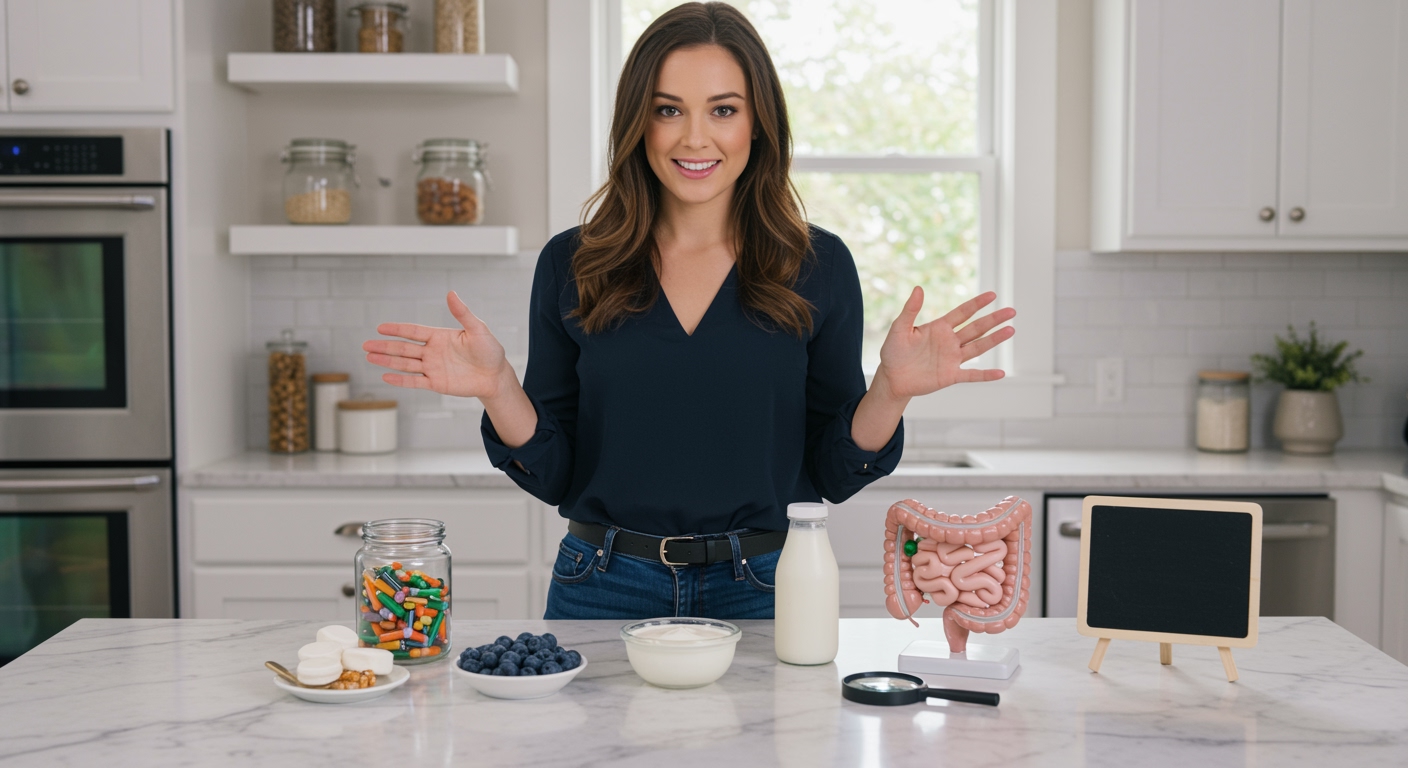✪ Key Takeaway: Research shows specific probiotic strains can improve insulin sensitivity and reduce inflammation in PCOS patients.
Introduction
Your doctor probably never mentioned that your gut bacteria might be sabotaging your PCOS symptoms.
You might be wondering if probiotics could finally give you the hormone balance and weight management support you have been searching for.
Hi, I am Abdur, your nutrition coach and today I am going to explain exactly how probiotics work for PCOS and which ones actually deliver results.
How Does Your Gut Affect PCOS Symptoms?
Your gut microbiome directly influences hormone production and insulin sensitivity in ways that most people never realize.
Women with PCOS typically have fewer beneficial bacteria and more harmful strains compared to healthy women.
This imbalance creates chronic low-grade inflammation that worsens insulin resistance and disrupts normal ovarian function.
Bad bacteria produce compounds called lipopolysaccharides that trigger inflammatory responses throughout your body.
These inflammatory signals interfere with insulin receptors and make your cells less responsive to insulin.
Poor gut health also affects the production of hormones like GLP-1 that help regulate blood sugar and appetite.
✪ Fact: Women with PCOS have 40% less bacterial diversity in their gut compared to healthy women.
Which Probiotic Strains Actually Work For PCOS?
Not all probiotics are created equal when it comes to managing PCOS symptoms effectively.
Lactobacillus acidophilus has shown the most promising results for improving insulin sensitivity in clinical studies.
Bifidobacterium lactis helps reduce inflammatory markers and supports healthy weight management in PCOS patients.
Lactobacillus casei works specifically to lower testosterone levels and improve menstrual regularity.
Research shows that multi-strain probiotics containing these specific bacteria produce better outcomes than single-strain supplements.
The effective dosage ranges from 1 billion to 10 billion CFUs per day depending on the strain combination.
You need to take probiotics consistently for at least 12 weeks to see meaningful improvements in PCOS symptoms.
✪ Pro Tip: Look for probiotics that are specifically tested for stability and contain prebiotic fiber to feed beneficial bacteria.
What Benefits Can You Expect From Probiotics?
Clinical studies show that the right probiotics can improve insulin sensitivity by up to 25% in women with PCOS.
Many women experience better menstrual regularity within 3-4 months of consistent probiotic supplementation.
Probiotics help reduce chronic inflammation markers like C-reactive protein and interleukin-6.
Weight management becomes easier as probiotics improve metabolic function and reduce cravings for sugary foods.
Some women notice improvements in skin health and reduced acne due to better hormone balance.
Digestive symptoms like bloating and irregular bowel movements typically improve within the first few weeks.
✪ Note: Individual results vary and probiotics work best when combined with a balanced diet and regular exercise.
Are There Any Risks Or Side Effects?
Most women tolerate probiotics very well with minimal side effects when starting with appropriate doses.
Some people experience mild digestive discomfort like gas or bloating during the first week of supplementation.
These temporary symptoms usually resolve as your gut microbiome adjusts to the new bacterial strains.
Women with compromised immune systems should consult their doctor before starting any probiotic regimen.
Quality matters significantly because poorly manufactured probiotics may contain harmful contaminants or inactive bacteria.
Always choose probiotics from reputable companies that provide third-party testing certificates and proper storage instructions.
✪ Pro Tip: Start with half the recommended dose for the first week to minimize any initial digestive adjustment.
Should You Try Food Sources Instead Of Supplements?
Fermented foods provide natural probiotics along with other beneficial compounds that supplements cannot replicate.
Plain Greek yogurt contains live cultures but the bacterial strains may not be the most effective ones for PCOS.
Kefir typically has more diverse probiotic strains than yogurt and may provide better results for hormone balance.
Fermented vegetables like sauerkraut and kimchi offer probiotics plus prebiotic fiber that feeds beneficial bacteria.
Food sources alone rarely provide the therapeutic doses needed for significant PCOS symptom improvement.
The most effective approach combines targeted probiotic supplements with regular consumption of fermented foods.
This strategy gives you both the specific strains proven helpful for PCOS plus the nutritional benefits of whole foods.
✪ Fact: One serving of kefir contains up to 61 different probiotic strains compared to 2-3 strains in most yogurts.
The Bottom Line
Research clearly shows that specific probiotic strains can significantly improve insulin sensitivity, reduce inflammation, and support hormone balance in women with PCOS.
Your gut health is the foundation of hormone health, and fixing one often fixes the other.
I would love to hear about your experience with probiotics or any questions you might have about incorporating them into your PCOS management plan in the comments below.
References
At NutritionCrown, we use quality and credible sources to ensure our content is accurate and trustworthy. Below are the sources referenced in writing this article:
- Frontiers in Nutrition: The Role of Probiotics in Women with Polycystic Ovary Syndrome
- PMC: Probiotics and PCOS: A Systematic Review
- Cleveland Clinic: Probiotics
- PMC: Effects of Probiotics on Metabolic Parameters in PCOS





